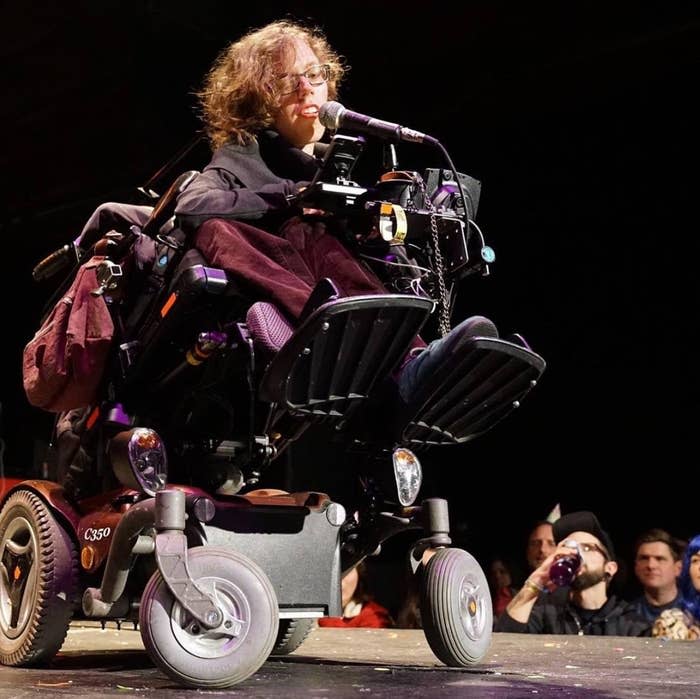We Talked To People Living With Disabilities About Sex, And Here's What They Had To Say
When Jade Theriault was a first-year in college, one of the staffers in her residency program for folx with disabilities was an eccentric female who liked asking Theriault a lot of personal questions. Some of these questions bordered on TMI.

Theriault — who identities as a wheelchair-liberated disabled comedian, musician, and artist — recalls the staffer asking her if she had ever masturbated. When Theriault replied "no," the assistant took her to a nearby Good Vibrations sex shop and got Theriault her first bullet vibrator.Clueless, Theriault told the staffer to "turn it on, stick it up there, and leave the room."
"I felt like there was a dying animal up there," says Theriault, who is 27 and based out of Oakland. "I felt broken and I didn't know what to do."When the staffer returned, she told Theriault she was doing it all wrong and put it in the right spot. "After that night, something clicked in my brain. I thought to myself, I've got to figure this out to make this happen, because the pleasure and relief were so great."
For many folx in the US living with disabilities like Jade, sex education isn't always up to par or sometimes isn't given at all.
For the 61 million Americans who live with a disability, lack of access to resources and education is a major barrier to enjoying a sex life that is filled both with pleasure and satisfaction according to Evan Sweeney, a sex and disability educator at Cripping Up Sex With Eva.
What are some other struggles that individuals with disabilities face when it comes to sex education and sexual freedom? Let's dig a little deeper, take a closer look, and see how folx can potentially deal with them and enhance their sex lives.
One major challenge is society's misconceptions. Trista Marie McGovern — who is a queer writer with disabilities, model, photographer, and advocate — finds that the biggest challenge people with disabilities face with their sex lives is rooted in society's perception and actually having to educate those around them about disability and sexuality.
What other misconceptions do people have? There are plenty. Society also tends to think that people living with disabilities only have sexual relationships with other folx living with disabilities, explains Holly Wood, a clinical sexologist and PhD student in human sexuality. This way of thinking identifies someone as having a disability first and as a person — or sexual being — second.
Another misconception is that individuals with disabilities are always asexual. They're often not seen and/or treated as children. And in turn, they are thought to not have sex lives or sex drives at all. "Society often infantilizes disabled people so it is hard for us to be seen as sexual," says Sweeney.

The challenges largely stem from the society we live in, adds Theriault. "My problem isn't that I'm in a wheelchair," she says. "It's that society has this perception. I do have a sex life. I've been intimate with people."
Wood explains that another prevalent myth is that folx in wheelchairs, and folx with spinal cord injuries (SCI) specifically, can’t feel their genitals or experience orgasm.
ABC / Via giphy.com
"In fact, not all people with SCI experience a loss of sensation in the genital region and there is published research to support that about half of people with SCI can experience orgasm," she says.
And beyond the oh, so many misconceptions, there is also the fact that those with disabilities can often be fetishized. This is something that Theriault has run into again and again. "In any marginalized group — black, gay — they fetishize you. I've been on a few people's bucket lists. You only want to sleep with me because I'm in a wheelchair. In that case, you're using me for your weird, fetish thing and I'm using you to have sex."
Next, let's talk about shame. The perception one has about themselves and society's perception can result in their feeling shame about their sexuality. In turn, shame can play a huge role in limiting sexual liberation for those with disabilities due to societal barriers and internalized ableism, explains McGovern.
Beyond shame, as sex is usually an intimate act that happens behind closed doors, privacy issues may also come up for folx with disabilities. For example, one might have professional help, such as an assistant, come by to help with daily tasks or live-in help.
Now that we've gone over the long list of (just some of the) misconceptions and barriers people tend to have about those with disabilities and their sex lives, let's talk about some ways one can go about enhancing their sex lives.
grown-ish / Via giphy.com
For those who have physical barriers engaging with "standard" — or society's view of standard, rather — sex, it's important to engage in self-pleasing and experimentation, says Wood. Some folx living with a disability may not participate in what society considers "typical" or "normal" sex but as Wood explains, there are many different ways to express sexuality and sexual feelings.
"For folx living with a disability, this may require a little more planning and creativity, as well as switching of positions to make sex more comfortable or to make certain erogenous zones more accessible," says Wood. "But with a little trial and error, and a supportive partner or partners, this is certainly doable. It's really up to each individual to determine what sex looks like for them."
Some folx with disabilities may experience physical limitations that impact sexual functioning. Think loss or change in physical sensations, difficulty controlling certain muscles, and inability to achieve or maintain an erection. But this doesn't mean that they can't experience sexual pleasure or even orgasm, says Wood.
cartoonnetwork / Via giphy.com
"For example, even women who have experienced SCI report that they can experience orgasm from more traditional activities. They just might experience it differently or in different parts of their body," she says.
Wood always explains that it's important to remember that sex involves so much more than just the genitals and that people can "get off’ from a variety of sensations. "Each individual simply needs to get to know their own body and how it reacts to certain situations to determine what feels good to them."
For instance, tantric sex is something Theriault started doing naturally a few years ago. It was only after she googled it that she put a name to it. "A lot of people do it," she says. "When you're horny enough and you have an active imagination, it's easy to put your brain there."
In Theriault's experience, it's all about looking for alternative, classy, and honest ways of showing affection in lieu of touching shoulders, brushing hair from their eyes, and leaning in for a kiss. "If we manage to break through each other all the way to the sexy times, the hope is that we can communicate," says Theriault. “'What I can give, what I want to receive' sort of thing."
Of course, everybody is different, adds Theriault. "The only thing I can say to other disabled people is you are natural-born problem solvers. Learn how to fuck like you learned how to shower. It's just another ADL."
To work through any physical challenges that may arise in sex, there are a number of things that people living with disabilities can do to make sex more physically comfortable. Plus, this can also make certain erogenous zones more easily accessible. "You can switch up positions, like having one person on top of another lying down, having sex in a spooning position, or sex in a chair or wheelchair," says Wood.
Apple TV / Via giphy.com
And just like how for anyone, you need to make some tweaks to positions with a new sexual partner, McGovern has used a pillow to elevate her hips for better angles. "I obviously have a different body to navigate for people but it’s just aligned in a different but self-explanatory way," says McGovern.
Also consider incorporating “sex furniture” or positioning products, says Wood. For example, the IntimateRider was designed by a person with C6-C7 quadriplegia to facilitate positions for sexual activities and to aid with thrusting and sexual movement.
There is also a wide range of sex toys that can help if you have limited mobility with your hand, says Wood. For instance, massager wands with long handles to expand reach, and toys and cuffs designed to assist with hand dexterity, weakness, or mobility issues.
All in all, it's really about developing a "new normal" when it comes to sex. And for that to happen, one must explore both individually or with a partner, through experimentation.
20th Century Fox / Via giphy.com
"It's important to find out what feels good to you and to remember that it's not just about the genitals," says Wood. "There are many ways to express sexual feelings, including kissing, massaging. Our most powerful sexual organ is our brain and there are a number of ways to enhance this, whether if it’s through fantasies, relaxation, meditation, or breathing techniques."
Exploring physical sensations can help you fine-tune the best recipe for sexual experiences outside of genital stimulation. "For example, people with SCI have reported experiencing great pleasure from stimulation in areas like the nipples, arms, thumb, earlobe, neck, and cheek, so much so that it can even lead to orgasm," she says. "It’s all a matter of understanding our personal turn-ons and turnoffs, and then working with a trusted partner to explore these in the context of a relationship."
Working with a pro, such as with a sex therapist or intimacy coach, could also be helpful. A sex therapist, as Wood explains, can address the many different emotional components of sexuality — think self-esteem, assertiveness, and positive self-talk — as well as collaborate with partners and family around sexual and fertility issues. They can also help address trauma and grief around sex and sexuality.
jointeamalpha / Via giphy.com
An intimacy coach or sexological bodyworker can work with you one-on-one on overcoming any blocks you might have. And through education and exercises, they can help you get in touch with pleasurable sensations.
"Working with someone specialized in sexual health can help in educating individuals and their partners on the complex changes to sexual function as a result of chronic illness or disability, and can offer specific suggestions to enhance sexual functioning," says Wood.
If you're interested in working with a pro, you can check out the following resources:
Association of Certified Sexological Bodyworkers (ACSB)
San Francisco Intimacy & Sex Therapy CentersSensual Solutions for Disabled Adults

